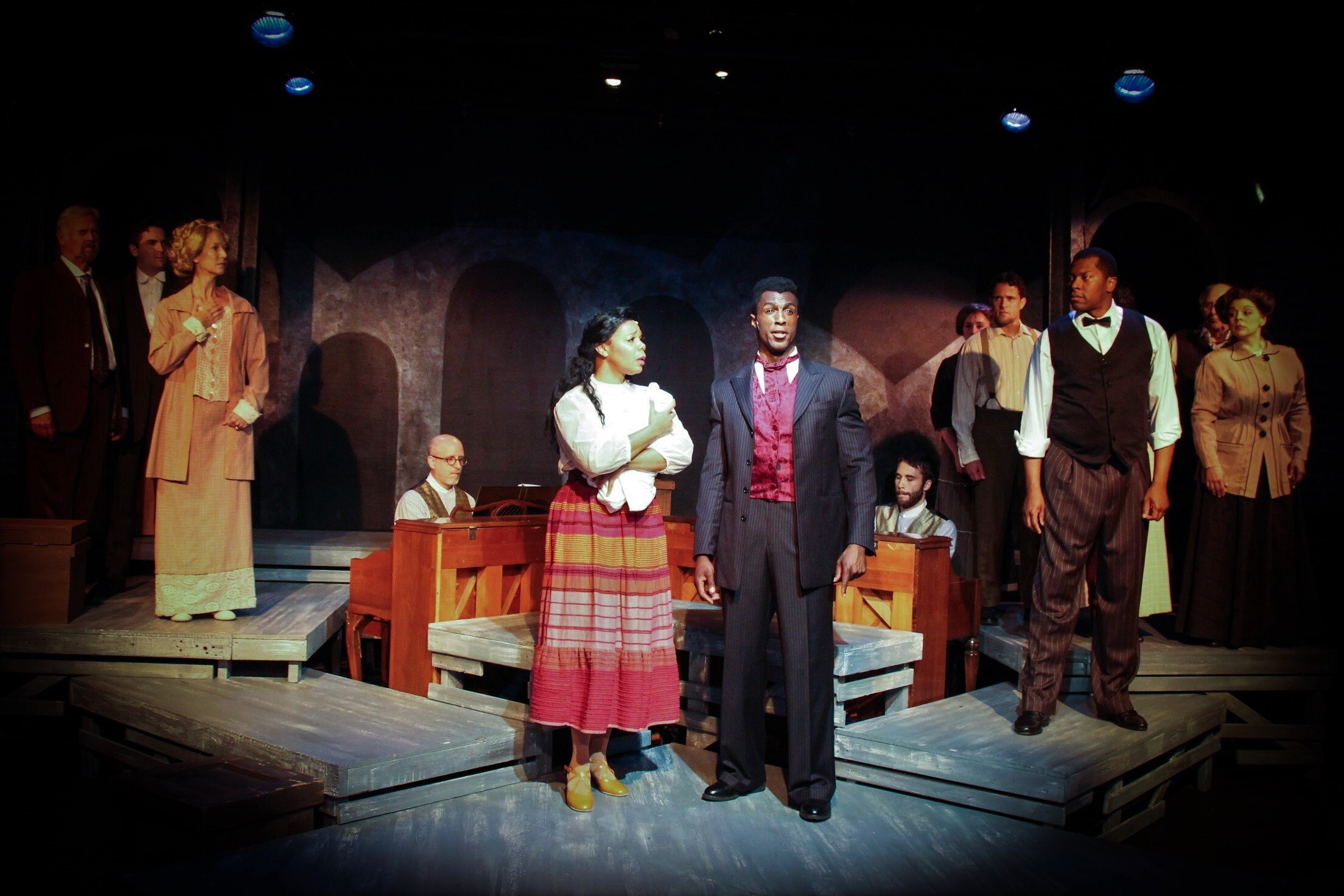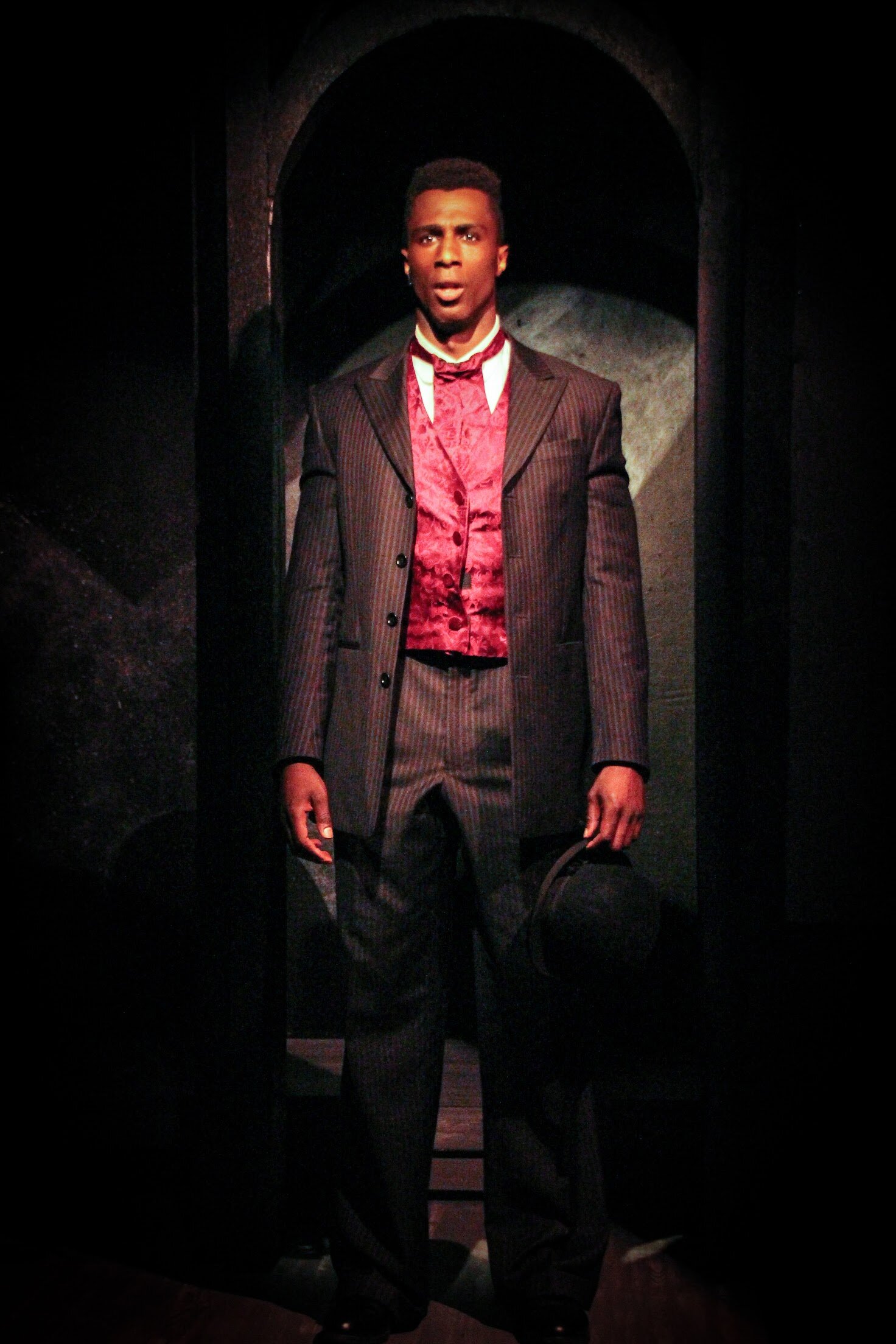Fully Committed, Music Theatre of Connecticut
When Becky Mode’s comedy Fully Committed was playing on Broadway in 2016, critic Charles Isherwood of the New York Times quibbled about the changed attitude toward the kind of conspicuous consumption displayed at the ultra-exclusive restaurant featured in the play at the time as compared to 1999, when the play first ran at Vineyard Theater. It was a canny reference to how context can change what we laugh at or not in a play that gently ribs a certain stratum of society.
Now, in the midst of the COVID-19 epidemic that closed theaters last spring, the antics of Sam, an actor between roles who works on the reservation desk in the basement of a “world-renowned, ridiculously red-hot Manhattan restaurant,” comes freighted with not a little nostalgia. Once upon a time people gathered in theaters and in restaurants, and you could pack both to capacity. Not so now. Music Theatre of Connecticut is one of very few theaters given the go-ahead by the state of CT and by Actor’s Equity to reopen, and MTC’s in-person seating has been shrunk to 25. Others may view the show live online. Which is how I saw it on opening night.
Matt Densky as Sam in Fully Committed at Music Theatre of Connecticut, directed by Kevin Connors (photo by Alex Mongillo)
The play is a one-person show. Sam, played by Matt Densky, arrives for work in the de rigueur mask of our times, then is able to get on with his job unmasked. The play’s action, without any face-to-face contacts, seems only too apropos. In his post, a sort of remote frontlines, Sam must man all alone multiple phones spread across the space where calls overlap and interrupt. Densky acts out a tour de force of the voices and mannerisms of all the callers, while Sam deals with ricocheting situations and considerable comic crosstalk, and comes out of the whirlwind “with his soul untouched” (as The Boss might say). It’s all enacted by Densky in split-second changes that are likely to make you a bit punchy, and, while more wit in the lines would be welcome, Densky is a versatile comic actor able to score delighted laughs with shifts in voice and attitude.
Matt Denksy in Fully Committed at Music Theatre in Connecticut, directed by Kevin Connors (photo by Alex Mongillo)
There’s the fussy French Maître D, the louche head chef—who sounds suspiciously at times like a certain overbearing political figure of our day—a co-worker calling in with MIA excuses, a wise guy, a big name actress’ manager, and a dizzying array of would-be clientele, some the height of pretentiousness, others the height of cluelessness. And all of it is handled by Sam like a candle burning both ends while he also deals with a few matters on the home-front: his disarmingly sweet dad wants him home for Christmas, his acting friend is having a big break, and Sam is sweating out the wait for a potential callback at Lincoln Center. All within the realm of reality in Manhattan.
And that’s the fun of the play but also—now—its poignancy. We took all this for granted, now look. What’s more, the fact that restaurants are re-opening with much more limited seating makes vying for that one table by the window (or what have you) more anxious than ever. The play, formerly a kind of high energy lark on the madness of multitasking (in the days before ubiquitous cellphones), has been updated a bit, so that Sam’s personal calls are on cell while the landlines are all for work. We see before us a kind of wonderfully choreographed chaos. It’s still high energy, it’s still a lark, but now we’re apt to be more than a bit apprehensive about that man on the flying trapeze, so to speak. Won’t someone give Sam a break—from the calls and in his career? Won’t someone drop a food pellet to the poor creature on his dreadful treadmill?
Matt Densky in Fully Committed at Music Theatre of Connecticut, directed by Kevin Connors (photo by Alex Mongillo)
Our attitude toward the action might take its cue from what we take Sam to be. Is he an actor who has to work a desk, or a worker who wants to be an actor? Unlike on Broadway with a name actor like Jesse Tyler Ferguson giving the show some celebrity box office, here Matt Densky is a native of CT who has done comic wonders at MTC in The SantaLand Diaries and The 39 Steps (and is on pandemic hiatus from the Broadway tour of WICKED) and he makes Sam’s situation feel that much more earned. Directed by Kevin Connors on a wonderfully detailed set by Jessie Lizotte, Densky’s Sam is beleaguered but never quite beside himself. He’s got great turn-on-a-dime timing and plenty of panache. We believe he could become as good an actor as Densky is. In other words, there’s hope for the performer of even the most thankless task—at least in Manhattan. Back then.
Seeing the show online provides its own sense of paradox. What makes a theater like MTC a treat is its intimacy; every seat is close to the action. Online, the show is viewed at a distance that’s a bit like having a Broadway mezzanine seat (which critics are never given!), though the broadcast sound leaves a bit to be desired, as the surrounding space creates more distortion than the direct-feed of computer-to-computer hook-up does on Zoom streams. Perhaps that can be improved, but in any case Fully Committed—which is the catch-phrase for a restaurant totally booked—is a good choice for those of us not yet fully committed to sharing public spaces with our fellow sufferers in the current state of affairs. It’s a play rather light on plot but strong on presence, and that serves to remind us of why live theater helps make life worthwhile. And it’s therapeutic to see someone onstage again! The make-believe of theater can’t always keep chaos at bay, but theater as make-believe chaos can be an apt diversion.
Only commit.
Matt Densky in Fully Committed at Music Theatre of Connecticut, directed by Kevin Connors (photo by Alex Mongillo)
Fully Committed
by Becky Mode
Directed by Kevin Connors
With Matt Densky
Scenic/Prop Design: Jessie Lizotte; Lighting Design: RJ Romeo; Costume Design: Diane Vanderkroef; Sound Design: Will Atkin; Stage Managing: Jim Schilling
Music Theatre of Connecticut
September 11-27, 2020
From the press release:
MTC is thrilled to be reopening its doors as one of three professional theatres in the country to be given permission to host indoor events via the approval of the state of CT and Actor’s Equity Association. Alongside this reopening comes health & safety protocols to assure the safety of the audience, crew, and actors. Some of these protocols include staggered arrival based on seating, no more than 25 audience members in the theatre, and masks required at all times. Until further notice, all performances will not only be presented in person, but through live stream as well, so that the shows may be watched live from the comfort of your home. Both in person and live stream tickets are available. For more information on MTC’s reopening protocols you can go here.














